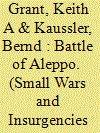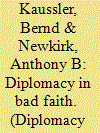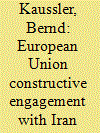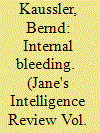|
|
|
Sort Order |
|
|
|
Items / Page
|
|
|
|
|
|
|
| Srl | Item |
| 1 |
ID:
173822


|
|
|
|
|
| Summary/Abstract |
Civilian victimization, whether deliberate or collateral, is a common occurrence in civil war. This study investigates patterns of civilian victimization during the 5-year Battle of Aleppo, a major campaign of the Syrian Civil War in which there were 24,462 documented civilian fatalities. We argue that the primary belligerents and their external patrons respond to shifts in the conflict’s strategic balance of power, employing more indiscriminate force when their opponent is gaining advantage, resulting in higher civilian fatalities. A quantitative analysis of the Battle of Aleppo models weekly civilian fatalities as a function of belligerents’ conflict initiation interacted with regime and rebel offensives aimed at shifting the status quo. While regime-initiated conflict events appear to be the primary determinant of civilian fatalities, our analysis finds that conflict events initiated by the opposition forces during periods of rebel offensive gains are associated with fewer civilian casualties, while pro-government external intervention during rebel offensives is associated with elevated civilian fatalities. We expand on these findings through a focused case study of third party intervention during the final year of the battle, with emphasis on the Russian intervention on behalf of the Syrian Regime that broke the opposition’s final counteroffensive.
|
|
|
|
|
|
|
|
|
|
|
|
|
|
|
|
| 2 |
ID:
114171


|
|
|
|
|
| Publication |
2012.
|
| Summary/Abstract |
American-Iranian relations have always been the most significant variable in Iran's nuclear programme, yet, in the absence of direct diplomatic communication, have never been addressed during multilateral negotiations. Since 1979, misperceptions of each other's intentions and capabilities have prevented Iran and the United States from escaping an ambiguous "cold war" relationship. The decision of the Obama and Ahmadinejad governments to open negotiations in Switzerland in Autumn 2009 marked the first bilateral high-profile meeting between both countries in over thirty years. At this time Iran was dealing with the effects of its June presidential elections, which was Teheran's greatest crisis of legitimacy since the Islamic Revolution. In addition, Iran's power elite was informed by a siege mentality vis-à-vis its own people and the international community. Also at this time, the Barack Obama Administration decided to engage Teheran directly. The Iranian government failed to reciprocate American initiatives. The breakdown of talks has, in turn, produced a new United States-sponsored containment doctrine against Iran. Whilst Washington may have shed an exclusive reliance on belligerency, as was the case under President George W. Bush, coercion remains the basis of Iran policy. Within two years after the Obama Administration began experimenting with "two-track" diplomacy, the situation has returned to mutual hostility. The United States and Iran are conducting diplomacy with each other in bad faith.
|
|
|
|
|
|
|
|
|
|
|
|
|
|
|
|
| 3 |
ID:
082261


|
|
|
|
|
| Publication |
2008.
|
| Summary/Abstract |
In 2002, the European Union (EU) announced that it would enter a Trade and Cooperation Agreement with Iran. The deepening of economic and diplomatic relations between the EU and Iran was, however, linked by the Commission to progress in four areas: human rights, non-proliferation, terrorism and the Middle East Peace Process. This article argues that the current focus on efforts to find a solution to Iran's nuclear ambitions has overshadowed the dynamics of EU human rights diplomacy towards that country. Unlike diplomatic pressure on the non-proliferation issue, the EU-Iran Human Rights Dialogue did not only enjoy great support by politicians and human rights activists, but did indeed result in changes in legislation and policies aimed at the protection of human rights. Europe's multi-track strategy allowed Iranian activists and members of the legal profession to approach the notion of human rights from within the Shi'a notion of justice and rationality and thus managed to assert Islamic roots for human rights and uncovered the very secular realities of human rights violations in the Islamic Republic. The Dialogue was launched at a critical juncture in Iran's reformist movement and helped likeminded politicians, particularly the executive and parliament, to gain momentum domestically and credibility internationally. While efforts at reform were and still are often impeded by the country's competing centers of power, this article argues that efforts to promote and protect human rights in Iran must not be sacrificed for concerns over the nuclear issue.
|
|
|
|
|
|
|
|
|
|
|
|
|
|
|
|
| 4 |
ID:
093213


|
|
|
|
|
|
|
|